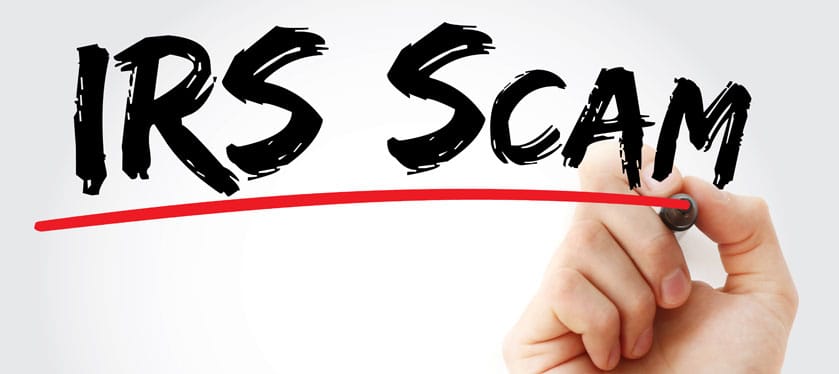Common IRS Scams to Avoid

IRS tax scams continue to be on the rise. Following the emergence of new variations of widespread tax scams, the Internal Revenue Service has issued another warning to taxpayers to remain on high alert and protect themselves against the ever-evolving array of deceitful tactics scammers use to trick people.
These schemes — which can occur over the phone, in e-mails or through letters with authentic looking letterhead — try to trick taxpayers into providing personal financial information or scare people into making a false tax payment that ends up with the criminal.
It is very important to use caution when viewing emails and receiving telephone calls purportedly from the IRS. Falling victim to a tax scam can be very costly, not only in money, but also in the amount of time and aggravation it can take to straighten out the resulting mess.
Phone Scams
The Treasury Inspector General for Tax Administration (TIGTA) called the phone calls the largest scam of its kind. The TIGTA has received reports of over 600,000 contacts since October 2013. TIGTA is also aware of nearly 4,000 victims who have collectively reported over $20 million in financial losses as a result of tax scams.
Scammers posing as IRS agents first targeted those they viewed as most vulnerable, such as older Americans, newly-arrived immigrants and those whose first language is not English. These criminals have expanded their targets and are now going after virtually anyone.
In a new variation, scammers alter what appears on your telephone caller ID to make it seem like they are with the IRS or another agency such as the Department of Motor Vehicles. They use fake names, titles and badge numbers. They use online resources to get your name, address and other details about your life to make the call sound official. They even go as far as copying official IRS letterhead for use in email or regular mail.
These scam artists often angrily threaten police arrest, deportation, license revocation or other similarly unpleasant things. They may also leave “urgent” callback requests, sometimes through “robo-calls,” via phone or email. The emails will often contain a fake IRS document with a telephone number or email address for your reply.
Thieves who run this scam often:
- Use common names and fake IRS badge numbers.
- Know the last four digits of the victim’s Social Security Number.
- Make caller ID appear as if the IRS is calling.
- Send bogus IRS emails to support the bogus calls.
- Make background noise of other calls being conducted to mimic a call site.
- Call a second time claiming to be the police or department of motor vehicles. The caller ID again appears to support their claim.
The IRS will never:
- Angrily demand immediate payment over the phone, nor will the agency call about taxes owed without first having mailed you a bill.
- Threaten to bring in local police or other law-enforcement groups to have you arrested for not paying.
- Demand that you pay taxes without giving you the opportunity to question or appeal the amount they say you owe.
- Require you to use a specific payment method for your taxes, such as a prepaid debit card.
- Ask for credit or debit card numbers over the phone.
Email Scams
It is also important to be on the lookout for possible email scams that use the IRS as a lure. You should know that the IRS does not initiate contact with taxpayers by email to request personal or financial information. This includes any type of electronic communication, such as text messages and social media channels. The IRS also does not ask for PINs; passwords; or similar confidential access information for credit card, bank, or other financial accounts via email.
If you receive a suspicious email, do not open any attachments or click on any links contained in the message. Instead, forward the email to phishing@irs.gov.
Here’s what you should do if you think you’re the target of an IRS impersonation scam:
- If you actually do owe taxes, call the IRS at 1-800-829-1040. IRS workers can help you with a payment issue.
- If you know you don’t owe taxes or do not immediately believe that you do, you can report the incident to the Treasury Inspector General for Tax Administration (TIGTA) at 1-800-366-4484.
- If you’ve been targeted by any scam, be sure to contact the Federal Trade Commission and use their “FTC Complaint Assistant” at FTC.gov. Please add “IRS Telephone Scam” to the comments of your complaint.
We hope this information will help keep you safe from potential IRS tax scams. If you have any questions or need additional information or any other assistance, please contact our Business, Corporate and Tax Law division.





